#dragons of heaven
Explore tagged Tumblr posts
Text
Heads Up 7 Up
thanks for the tag, @akiwitch!
Rules: Post the last 7 lines of your WIP.
gentle tag 2 @egpenrose, @mariahwritesstuff, @surroundedbypearls and @dyrewrites <3
Here's the latest part of chap 4 (that isn't non-linear chunked)
“Xingshe has missed a step,” he remarked with concern. “I can teach her again.” “Indulge her for now,” Xuanhuo drawled from the seat beside Bailian, his words uncharacteristically kind. “It's endearing to the people.” Glancing to his left and right, Yinsi could admit that the people did indeed seem enamored. Yet he worried all the same. “Is it not better to be correct than endearing?” he asked, turning his head to look back. Xuanhuo’s black, derisive gaze was framed by the faces of Qingsi and Hubei, who sat in the middle row. “What do you think this is all for?” Xuanhuo sneered.
6 notes
·
View notes
Text



Epilogue
Fade Couple
[needed to do more...] [part 1]
3K notes
·
View notes
Text

The return of the dragon's au, but this time for the TGCF
I regret that I did not think about Hua dragon earlier >"<
#fanart#digital art#mxtx#mxtx fanart#danmei#artists on tumblr#art#my art#digital illustration#artwork#au#dragon#dragon au#hualian#tgcf#tian guan ci fu#heaven official's blessing#hua cheng#hua cheng x xie lian#xie lian#tgcf san lang#mxtx tgcf#tgcf fanart
4K notes
·
View notes
Text
Rhaenys in heaven watching Oscar Tully wipe the ground with Daemon

#house of the dragon#rhaenys targaryen#oscar tully#daemon targaryen#idgaf about what she did#she's in heaven chilling with meleys and that's the end of that
4K notes
·
View notes
Text
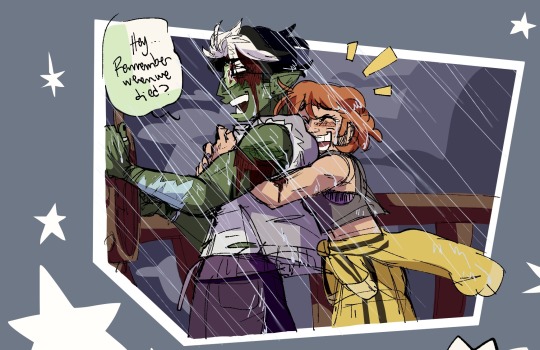
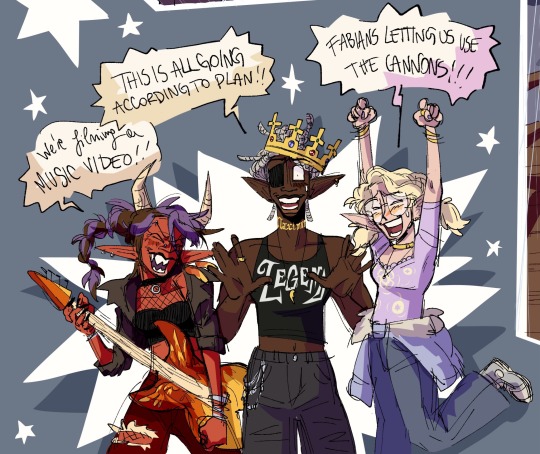
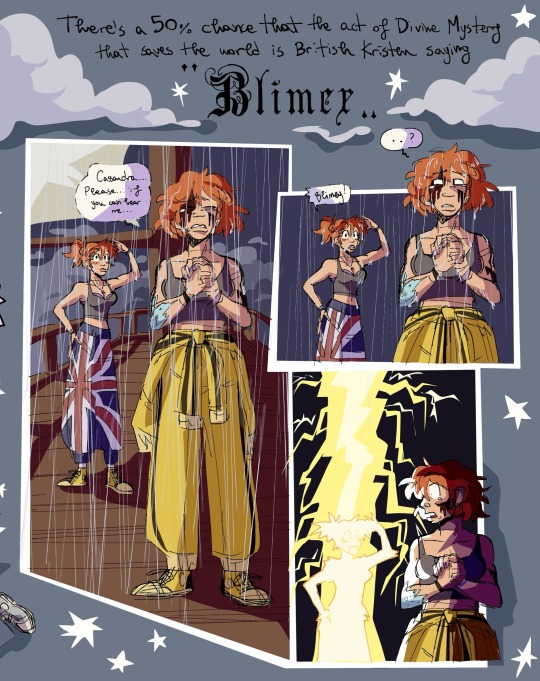
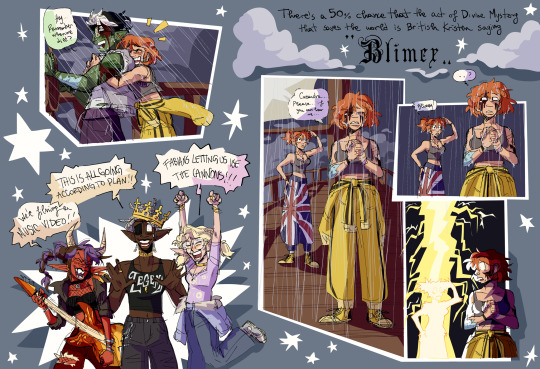
Blarmy!
#dimension 20#fantasy high#d20#fhjy#d20 fhjy#fig faeth#gorgug thistlespring#adaine o'shaughnessey#fabian seacaster#kristen applebees#k2#british kristen#heaven gained a real one today ….#the blimey intervention actually made me scream it was … it was crazy#the stuff of legend#also had to draw the party people ❤️#and gorgugs little comment#ive seen a couple of posts about it btw i see it more as a look how far weve come#like remember when we died to the corn cuties? well now were in the sky about to die from a bunch of fucking dragons attacking us#isnt life so funny
6K notes
·
View notes
Text

Dread wolf take me
#dragon age#dragon age veilguard#solas fanart#da4 solas#dread wolf#fen harel#dragon age the veilguard#datv#veilguard spoilers#the solavellan ending sent me to heaven
2K notes
·
View notes
Text
Solas x Lavellan
Dragon age the Veilguard
Tel banal, ara'ma
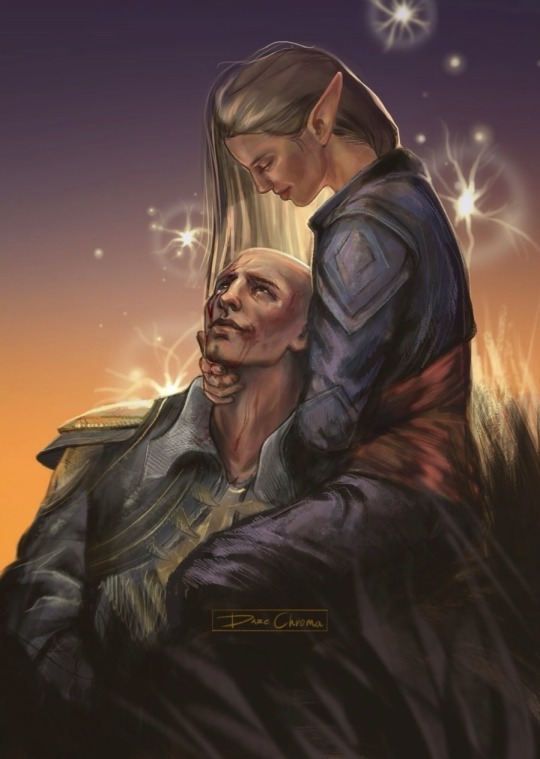
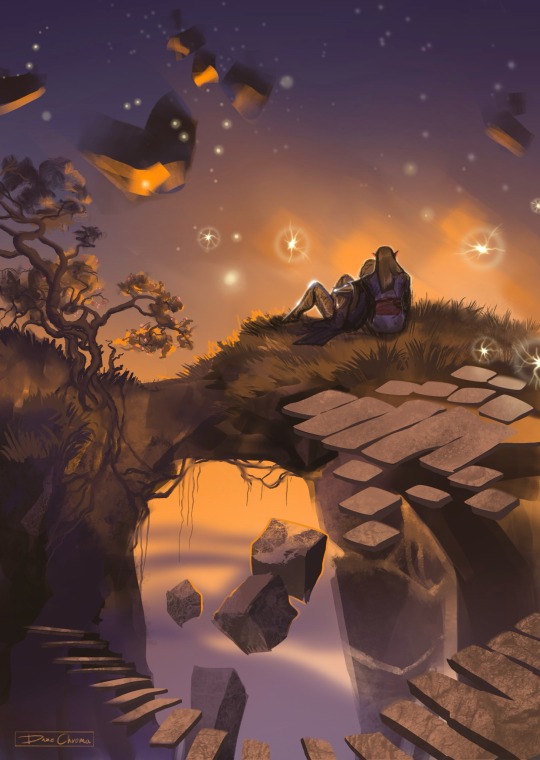
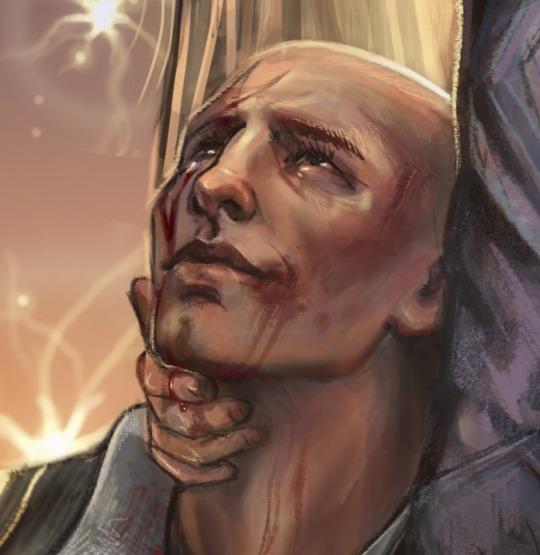
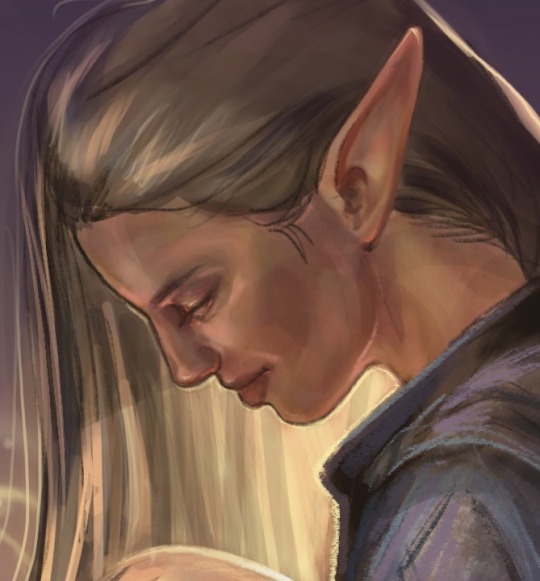
It won’t be terrible if you’re with me.
Available as print here.
#I enjoyed this process So MUCH#And what a process it was. In one wip Solas looked a little bit too beat up... to balance the line of disheveled and on the brink of death#Is a delicate line#And painting these floating stones was such a joy! Good practice too as I don't often draw spacious and atmospheric scenes#I should do it more often. I was inspired by the concept art of Dai and datv. The amount of stories you can tell with the colors! LOVE#I tried a new technique for painting the skin and it was challenging. I layered transparent colors over a black and white shadow sketch.#A technique usually kept for oilpainting but it translated surprisingly well in digital media#And side note. Aren't these the wettest eyes of Thedas? I'm proud.#Solavellan#solasmance#dragon age the veilguard#dragon age#solas#solas dragon age#solas x female lavellan#Post datv#datv spoilers#datv fanart#Solavellan fanart#Da4#da: the veilguard#veilguard spoilers#my art#Solavellan heaven#<- new tagg we went from hell to heaven ^^#DazeChroma#Daze chroma#Myart#digital drawing#Digital painting
2K notes
·
View notes
Text
sick-ass fancy dragon princes forced to reckon with trauma, loss, and the potential for immortality to breed immorality
Can you introduce your WIP in one sentence?
293 notes
·
View notes
Text

1K notes
·
View notes
Text

Today I am sad and I don't know how to cope with being sad so I projected my sadness on my favorite fictional character
#digital art#art#fanart#character art#procreate#great sage equal to heaven#digital drawing#sketch#unfinished#lego monkie kid#lmk wukong#lmk fanart#lmk six eared macaque#lmk sun wukong#lmk macaque#lmk mk#lmk#sun wukong#monkey king#six eared macaque#macaque#liu er mihou#lmk mei#mei dragon#shadowpeach
2K notes
·
View notes
Text
Lantern maker (need to name him)

Picrew tool by Elena-Illustration
5 notes
·
View notes
Photo
Cool pic but also it looks like Subaru wants to slap Seiichiro with his talismans, lol

10 notes
·
View notes
Text



✨Closure✨
[lies down- i finished it but my brain is still whirring I had to draw happy things]
[and now there's more]
2K notes
·
View notes
Text
Castles in the Fade, or What Was the Point of the Veil Anyway
Something that will now haunt me until the end of time is why was the concept of the Veil ever introduced into this series.
We’ve been hearing about it since the very first game. There’s a codex entry about tears in the Veil in Origins. Tamlen mentions a thin spot in the Veil if you play a Dalish elf. Sandal has a prophecy in Dragon Age 2: “One day the magic will come back—all of it. Everyone will be just like they were. The shadows will part and the skies will open wide. When he rises, everyone will see.” Admittedly, this is just one line said by a character who often says odd things, but it hinted to the fact they were planning to do something with the Veil from the very beginning. The state of the Veil is repeatedly brought up. It all had to mean something! Or so I thought.
When I saw “The Dread Wolf Rises” quest in Veilguard, I said, “Oh, here we go!” The Veil is coming down, magic is coming back, and it’s going to set up such an interesting story for the next game.
Alas, no.
I hadn’t really enjoyed my time playing Veilguard up until this point. It felt like the game was ducking and dodging every bit of world building and lore that could possibly bring nuance or complexity to the story. Every returning character or faction was a cardboard cutout of themself. They shoved Solas is a time-out box and gave him nothing to do. They refused to let him have any impact or influence on the story when he had been set up to be our main antagonist back in Trespasser. This game used to be called Dreadwolf! And while we learn about his past… we never talk to him about it. In the present, he’s in stasis.
Elgar’nan and Ghilan’nain are our villains. And they are your typical evil for evil’s sake villains. They are mad, bad, and only as dangerous as the narrative will allow as to not give Rook and co too much trouble. They are surprisingly patient while Rook fixes all their companions’ problems… until Elgar’nan moves the moon to cause an eclipse. A vital component in making his own lyrium dagger. For some reason. This guy can move a satellite!? And he just let Rook walk away in previous encounters… twice. Ok. Sure.
The Evil Duo need their own dagger ostensibly to tear down the Veil, because they want to unleash the full force of the Blight onto the world. Because they are evil. And they were thwarted last time they tried to Blight the entire world. Why do they think Blighting the world is a good idea? What’s the point of ruling a world if everyone is dead? I guess they haven’t thought that through, because of the madness and the evilness.
Ok, I thought. Perhaps the gods will be the one to tear down the Veil. Or maybe we’ll have a choice to let Solas do it his way before they can, which will be less chaotic and less full of Blight. Because the Veil has to be coming down one way or another? Why introduce the concept of the Veil, especially a Veil that has been thinning and failing since the series began, if it’s just going to… stay.
There is a principle in storytelling called Chekov’s gun. If something is mentioned in a story, it must have a purpose. If you keeping mentioning that gun hanging on the wall over the fireplace, it’s because at some point in the story, someone is going to take it down and use it. The Veil felt like Chekov’s gun to me. Chekov’s Veil, if you will. It’s been here from the beginning of our tale, the spectre hanging over our protagonists’ heads for multiple games.
The Veil has been a character unto itself. It was the central focus of the third game, and its dissolution was set up to be the core conflict of the fourth game. We learn everything we thought we knew about the Veil was a lie. It was not created by the Maker to separate the Fade from this world because of jealous spirits, it was created by a guy named Solas to trap the elven gods and the Blight from destroying the world. Also, the elven gods were never gods, and they are also evil.
This reveal will surely throw the Andrastian religion into chaos! This puts the very existence of the Maker into question! The Evanuris are a lie; it’s only fair Catholicism—oh, I mean—the Chantry is a lie too. We briefly touch on that in Veilguard… then it is quietly discarded. Religious crisis averted.
But I digress.
When the title of the fourth game was changed from Dreadwolf to Veilguard, I started to see the writing on the wall. Still, I held out hope the Veil would have some greater purpose in the story. That its introduction as a concept was for a reason. That something in this world would change.
Instead, from the get-go, the question of the Veil is no question at all. We only get Solas and Varric making oblique or catastrophizing statements about it. Solas says little beyond he has a plan. If I ever wanted to hear a villain monologue about their plan, it was now! Varric, on the other hand, decries Solas’s plan. He warns that should the Veil fall, it will destroy the world and drown it in demons. And that’s that.
We never really learn why Solas wants to tear the Veil down, or why he thinks it will help anyone. “The Veil is a wound inflicted upon this world. It must be healed,” he says. And that’s basically all he says about it in Veilguard. In Inquisition and Trespasser, we learn it took the immortality from the elves. It cut most of magic off from the world. Spirits are trapped and are being corrupted into demons, and most of what we know about spirits and demons is wrong. There are ancient elves possibly asleep? That part is left vague, but ancient elves are still about. We meet some in Mythal’s temple. There seems to have been some merit in bringing it down, because elves were flocking to Solas’s cause at the end of Trespasser. He had agents working for him already. What do they know that we don’t know?
Apparently nothing, because by the time Veilguard rolls around, there are no mention of agents. He is working alone. His only motivation now seems to be he’s too deep in his sunk-cost fallacy. The Veil is unnatural, so it must be removed—consequences be damned. We are never given any reason to think Solas has a leg to stand on in his pursuit of tearing down the Veil. We never hear any kind of counter argument from anyone, not even Solas, as to why the Veil should come down. We are only told it will destroy the world. It will drown the world in demons. This is all Solas’s fault.
There is no nuance. No complexity. No moral quandary to mull over. The game gives us vague warnings with no explanation as to what exactly is so world-annihilating about the Veil coming down. We must take Varric’s word at face value. We’re the heroes; Solas is the villain. Stop him.
It makes me wonder why Solas was ever a companion in Inquisition, let alone a romance option. Solas was presented to us as a complicated character in Inquisition. We had the potential throughout the game to make him see the value of this world, to help him realize he was wrong about it. “We aren’t even people to you,” the Inquisitor says in Trespasser. Solas replies, “Not at first. You showed me that I was wrong...again.” He began the third game viewing the world as tranquil, seeing the people in it as nothing more than figments in a nightmare, just as we saw our companions in the In Hushed Whispers quest. He ends the game having made friends, having recognized he was mistaken. He might have even fallen in love. (Or he may still seen no merit in this world if the Inquisitor antagonized him the entirety of their time together.) But something makes him continue with his plan to tear down the Veil, despite recognizing this world is real. He must know something we don’t. Something we’ll learn about in the next game.
We’ve been hearing about the Veil for three games now. We’ve set up our complex antivillain for the next installment, and he’s going to tear the Veil down. We swear to stop him or save him. But it has to be more complex than that. It can’t be so straightforward. Uncomplicated. Simple. Boring. Right? Right?
Nope. He really is just the villain, mustache-twirling and all. He apparently had no greater motivation, no as of yet unrevealed knowledge that would put this whole Veil thing into a new context. It was really as simple as the Veil falling will destroy the world, so Solas must be stopped. There is no new information that is revealed which makes us question what we are doing. Solas is never given any nuance or complexity to his actions. Nuance and complexity have actively been taken away. Both him and the Veil are looking like they are the worst things to be in a story: pointless. Why introduce the Veil if it’s just going to remain unchanged? Why introduce a character like Solas, bother humanizing him (for lack of a better term), giving us his backstory, setting him up as a cunning antagonist, only to make him look stupid, then put him on a shelf until the last ten minutes of your game?
Solas was the trickster archetype of this tale. He was our version of Loki from Norse mythology. What is the role of the trickster archetype? To challenge the status quo. To bring about events of extreme change, like say, the tearing down of a Veil that holds back all of magic. Loki is a huge contributing factor in Ragnarök. Through his manipulation, he causes the death of the beloved god, Baldr. This ushers in a long winter, which signifies the beginning of the end. Loki is imprisoned for this crime. When the final battle between gods and giants begins, the sun and moon are swallowed, plunging the earth into darkness. The earth shakes and Loki is freed to fight on the side of the giants. The world burns in raw chaos, falls beneath the sea, and is reborn. The world is remade, and a new realm of the gods and a new, better earth is formed.
It really felt like this was the setup they were going for. Solas causes the death of Mythal, and this is his catalyst for creating the Veil, which ushers in a world without magic. This could be seen as equivalent to the long winter. Solas falls asleep, trapped in dreams. He wakes and sets in motion bringing about the apocalypse. It’s not a perfect one to one, but it’s there if you squint. We have a war against the gods in Veilguard. I was expecting a few remaining Titans to wake and join the fight. But we don’t get any of that. There is a final battle, but it does not end in the end of the world. Or a better world. It just ends, and everything is the same.
It seems our trickster god caused his apocalypse thousands of years before our story started, when he created the Veil. His role in this tale was over before ours began, and he really is just some relic from a long-past age. He has no role, no purpose in this story. He is here to be thwarted. He is no Loki at all.
If you can’t tell, I wanted the Veil to come down. Did I think the Veil coming down would be painless? Have no negative consequences? No. Of course not. But keeping it up has negative consequences too. And it made for an interesting story. Or at least it could have. But we never explore that. The game presents no counter argument to having the Veil stay up, which, again, begs the question: what was the point of introducing the concept of the Veil at all?
Did I think the Veil coming down was actually the best solution to help Thedas become a better place? I don’t know, and I never will, because the game never argues for it one way or another. It just tells you to want it in place and to stop asking questions. In real life, a catastrophic event is not the best way to solve any of the world’s problems. But this is the realm of fiction. We have gods and monsters, magic and myth. We have introduced the status quo of Thedas, recognized it needs to change, then our trickster god appears ready to fulfill his role in the narrative.
Instead, it all comes to nothing.
I got to the end of Veilguard… and everything was more or less the same as it was at the start of Origins. Veilguard actually tries its hardest to pretend any previously mentioned problems don’t exist, so of course the Veil coming down has no merit. There are no problems to solve in this world, apparently. Solas is just stuck in the past and can’t get with the times. Silly Solas.
The Veil isn’t even a permanent solution. It wasn’t to begin with. It was some duct tape wrapped around a broken pipe, and we’ve just slapped an extra piece of tape on it. It’s still leaking. It is still unnatural, and will fall eventually one way or another. Large amounts of bloodshed weaken it, so I guess Thedas better achieve world peace real quick to avoid any battles. There were seven super-powered mages holding it together… now there is just one. Ironically, the Veil was going to fall after two more Blights anyway. The Wardens were doing Solas’s work for him! It would also have released the full force of the Blight at that time… which Solas was trying to avoid, I presume.
It feels like keeping the Veil up just pushed a big problem onto Thedas’ future generations. We’ll keep slapping bandaids on it until it all falls apart. Someone else can deal with the fallout, but we’ll be dead by then, so who cares.
Primarily, I wanted the Veil to come down from a storytelling perspective. The Veil was an interesting concept and I wanted the story to do something interesting with it. Conflict is what makes stories stories and the Veil coming down could create so much compelling and complex conflict. And the Fade is weird, and I like weird. Stories are also about change, and I wanted to see Thedas change. Yet, Veilguard is over, and barely anything has changed. Instead of magic coming back being a conflict for the next game, they went with Fantasy Illuminati. Oh.
The Veil turned out to be a nothing-burger, and no problems in this world are even close to being solved. Slavery is still rampant in Tevinter. The elven people are still oppressed everywhere. Mages have no more rights in the South than they did in Origins. Spirits are still trapped and being corrupted. The Calling still exists, though might be different somehow now? They don’t really get into that. The Chantry’s validity is still not allowed to be questioned. The Blight still exists in some form, but again it’s vague. Oh, and we learn the dwarves have been gravely wronged, and the Titans are still tranquil. At least if you redeem Solas and a romanced Lavellan joins him, they can work together on healing the Blight and helping the Titans. Oh, good. One problem is being acknowledged and some action will be taken. Offscreen. Hurray? Solas doesn’t have a really great track record of fixing problems, so Lavellan is definitely going to need to be there to make sure he doesn’t fuck it up.
For some reason, this game seemed terrified of letting us think about anything for more than two seconds. It shied away from complexity or nuance at every turn. The game is called The Veilguard—ironically, that word is never uttered in the game—but we are given no real motive for guarding the Veil. We’re unquestionably the hero. The villains are uncomplicatedly evil. Save the world… never wonder what you are doing or why.
I wanted the game to make me question if the Veil staying up or coming down was the right choice. I needed to be given a real counter argument. Convince me the alternative would actually be better or worse, because as I mentioned… things suck quite a bit in Thedas already for a lot of people right now. Let the Veil’s fate be a difficult choice to make. If the conflict cannot be what to do about the Veil, it should be am I doing the right thing about the Veil. If the heart of your game is so thin on motive, everything else falls apart around it.
I hoped they were setting up a complex, Thedas-sized existential conflict for this game in Trespasser, but no. I wanted something to happen, but nothing did.
I want to feel challenged and changed by a story, not left feeling empty. I’m tired of superficial entertainment. I want to sink my teeth into a narrative that doesn’t paint the world in broad strokes of black and white, good and evil, heroes and villains.
Ultimately, I think my issue is why even introduce a concept like The Veil if you’re not going to do anything interesting with it. Or anything at all. What I thought was Chekov’s Veil turned out to just be a MacGuffin. And that’s disappointing.
#dragon age#the veil#the veil the veil the veil#solas#in which I shake my fist at heaven for 3000 words
958 notes
·
View notes
Text
i love the idea of solas and lavellan getting married over and over throughout their eternity together. sometimes it happens with a plan in mind, and others just when the mood strikes. sometimes they wed in quiet seclusion, with only the wisps and the spirits to witness, or sometimes with loved ones, when they're craving excitement and a brief visit home. occasionally there is tradition. more often there is not.
i can see it becoming part of their myth over centuries: clans marking the end of the final blight with a yearly party that looks quite a bit like a dalish wedding. it's not uncommon for couples to say their vows throughout the celebration, or to cloak each other in wolf pelts, or give carved trinkets in the shape of a hand.
and though it is difficult to substantiate through time and history, some clans claim to have seen them amongst their own revelers: the dread wolf and his bride, come to celebrate with the people, laughing and dancing and gone by morning, back to the fade.
#LIKE I KNOW IT'S CHEESY BUT I'M A ROMANTIC AT HEART AND YOU CAN'T TAKE THAT FROM ME#solavellan#solas#solavellan heaven#datv#dragon age the veilguard#solavellan hell#solas x lavellan#solasmance#solas meta#solas x inquisitor#solas dragon age#lavellan
545 notes
·
View notes
Text





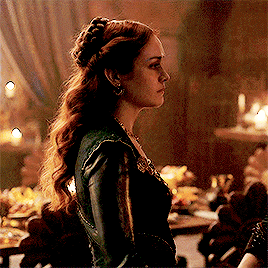


#hotdedit#rhaenicent#alicent hightower#rhaenyra targaryen#house of the dragon#rhaenicentedit#rhaenyra x alicent#myedit#:) AND WHAT IF I END IT ALL#THE LOVE SHE HAS FOR HER!!!!!!!!!! that always has been n always will be!!!!!!!!!!!!#every day i wake up n hate that old cnt for manipulating n brainwashing her oh hes not seeing heaven for this...... 😃
1K notes
·
View notes